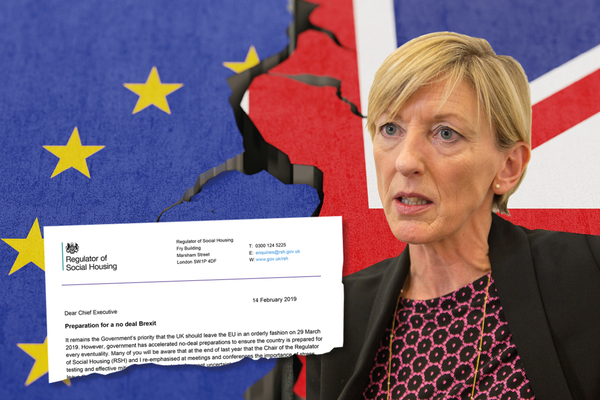Regulator writes to housing associations with no-deal Brexit warning
The regulator has issued a warning to English housing associations over the threat of a no-deal Brexit, outlining key risk areas including shortages of crucial materials, a housing market crash and difficulties accessing ‘business-critical’ data.
In a letter sent to the bosses of English housing associations today, Fiona MacGregor, chief executive at the Regulator of Social Housing, urged associations to ensure their plans for dealing with a “disorderly Brexit” are robust, as the departure date of 29 March approaches.
She listed six key areas which the regulator says it has “identified based on its analysis and contacts with registered providers”.
These are:
- A deteriorating housing market
- Interest, inflation and currency risk
- Access to finance
- Availability of labour
- Access to materials and components
- Access to data
Ms MacGregor wrote: “It remains the government’s priority that the UK should leave the EU in an orderly fashion on 29 March 2019. However, government has accelerated no-deal preparations to ensure the country is prepared for every eventuality.
“In the current context, the regulator expects registered providers to have: identified the risks to which their businesses would be exposed; stress-tested their business plans to reflect these; and identified specific, deliverable and timely mitigations, to ensure viability is maintained and tenants and social housing assets are protected.”
With just 43 days until Brexit and no deal yet agreed by parliament, the default position is a no-deal exit, should MPs be unable to agree on a deal or an extension to the deadline.
In her letter, available below, Ms MacGregor told associations planning “effective mitigations” to the risks is likely what requires the most board level attention as these “are often more challenging than the process of identifying key exposures”.
She said associations should “inform the regulator as soon as possible” if they realise the risks are enough to threaten their businesses.
The letter said the threat of a “sudden housing market downturn” would provide the “greatest financial impact”. She noted Bank of England projections which suggest a fall in house prices of up to 33%.
“Falling house and land values would reduce profitability and potentially crystallise impairments, while lower transaction volumes would increase working capital requirements and decrease cashflow,” she wrote. She said valuations of properties used as security for loans could also be hit.
Related Files
Ms MacGregor also warned of shortages of materials key products such as boilers, lift components and district heating systems which are sourced from the EU and “not readily stockpiled”. “This could result in some major repairs taking longer than usual to complete,” she wrote.
She also warned housing associations may be unable to access their own data if it is located outside the UK or in cloud-based data storage.
“As part of their stress-testing and scenario planning, it may be necessary for providers to establish where all key data is held,” she wrote.
Listen to a podcast on the impact of a no-deal Brexit:
Access to finance was also cited, with Ms MacGregor noting that banks may become “more risk averse”. She said this could “have severe effects” on providers looking to arrange new facilities and may restrict development ambitions in the long term.
Shortages of labour – particularly in construction and care – were also cited with a warning that inflation in labour costs may outstrip general inflation and therefore rental income.
She noted the Bank of England’s scenarios of inflation of up to 6.25% and an increase in base rate interest to 5.5%. Some housing providers have built rents not being allowed to increase at inflation into their stress testing – although Ms MacGregor did not mention this as a possibility.
She added that despite the risk, she believes providers can “successfully manage” the impact “with appropriate preparation and effective mitigations in place”.
A spokesperson for the Ministry for Housing, Communities and Local Government said: “Leaving the EU with a deal remains our top priority, but as a responsible government we’re planning for every eventuality, including no deal.
“Housing association boards should be planning sensibly for all scenarios. We have published extensive advice on the steps that businesses and citizens may need to take to prepare for Brexit.”
Read more about Brexit
Brexit and the social housing sector: the key risks As the tortuous process of exiting the European Union approaches its denouement, the country remains in a state of uncertainty about what exactly is going to happen. Peter Apps recaps the key risks to the social housing sector
Downturn: why is L&Q cutting its surplus in half and what does it mean for the sector After L&Q revealed it is likely to cut its surplus by £158m this year, Peter Apps asks what this means for the financial model which has defined the housing association sector since 2010
What housing associations are doing to stress-test for Brexit With the UK’s departure from the EU looming, Luke Barratt looks at what housing associations have been doing to prepare
Regulator writes to housing associations with no-deal Brexit warning The regulator has issued a warning to housing associations over the threat of a no-deal Brexit, outlining key risk areas including shortages of crucial materials, a housing market crash and difficulties accessing ‘business-critical’ data
Sector draws up contingency plans for no-deal Brexit The country’s largest housing associations are putting in place contingency plans to protect the future of their organisations
How would the sector cope with a no-deal Brexit? As uncertainty around Brexit mounts and a no-deal looms, Inside Housing asks what it could mean for the housing sector
Current grant system won’t work in a falling market The government needs to think again about grant to prevent housing association development from collapsing in a falling market, writes Matthew Bailes.
S&P would downgrade half its rated housing associations after no-deal Brexit The credit ratings agency Standard & Poor’s (S&P) has said it will downgrade associations it rates if the UK leaves the European Union without a deal
Click here for all our Brexit news to date













